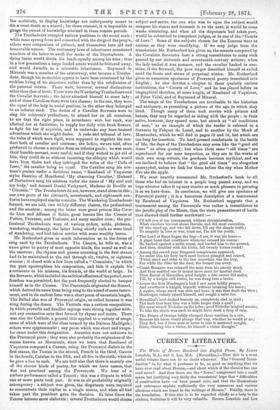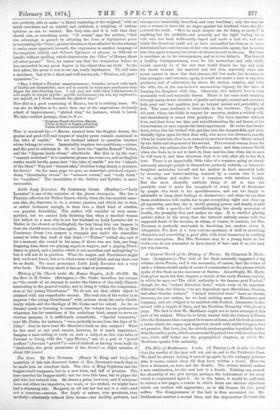CURRENT LITERATURE.-
The Works of Horace Rendered into English Prose. By James Lonsdale, MA., and S. Lee, M.A. (Macmillan.)—That this is a most useful volume there can be no doubt whatever. The "General Intro- duction" is, for what it professes to be, as good as anything that we have ever read about Horace,—and about which of the classics has one read more ? And then there are the "Notes," compressed into a small space, but justifying very fairly the translators' hope that "difficulties of construction have :et been passed over, and that the illustrations and references explain sufficiently the very numerous and various allusions which are found in the writings of Horace." Finally, there is the translation. If this also is to be regarded chiefly as a help to the student, doubtless it will be very valuable. Messrs. Lonsdale and L30
are perfectly able to make "a literal rendering of the original," with as much exactness and as careful and judicious a weighing of various opinions as can be wanted. But they aim, and it is well that they -should aim, at something more. "It seems," says the preface, "that one advantage is gained by adopting the form of rhythmical prose in translating the `Odes'; greater freedom is thus afforded for the attempt to make some approach towards the expression in another language of the exquisite felicity and delicate lightness of phrase, so difficult to handle without spoiling, which characterise the ' Odes' of Horace above all other poems." Now, we cannot say that the translation before us has succeeded in any great degree in the object thus set forth. In the first place, the prose is not, to our ear, really rhythmical. We will take a specimen. Let it be a short and well-known ode, "Persicos, odi, puer ! apparatus :"— " Boy, I detest a Persian sumptuousness ; wreaths twined with bark of linden are distasteful ; care not to search in what spot perchance may linger the late-blowing rose. I ask you not with busy toilsomeness to add aught to simple myrtle ; myrtle misbeseems you not, my cupbearer, nor myself, as I drink beneath the plaited vine."
Now this is a good construing of Horace, but it is nothing more. We can see no rhythm in it ; more than one of the expressions obviously admit of improvement ; "plaited vine," for instance, which is harsh. We take another passage, from iv. 8 :—
" Ereptum Stygiis Snail:as /Eacum, Virtus et favor at lingua potentium Vatum divitibus consecrat insulis."
This is rendered by,—" 2Eacus, reamed from the Stygian waves, the genius and good-will and tongue of mighty poets commit enshrined to the isles of wealth." We are inclined indeed to question whether virtus belongs to vatum. Immortality requires two conditions,—virtue, and the poet to celebrate it. So we have the "merita Bernal " before, and the adignum laude virum" afterwards. But this is by the way; "commit enshrined " is a cumbrous phrase for consecrat, and an English reader would hardly guess that "the isles of wealth " are the " islands of the blest." Why not "blessed isles," divitibus being clearly a synonym for be,atis? On the same page we note, as somewhat awkward expres- sions, "threatening verses" for "minaces versus," and "truly learn" for "condisce." The translation of the Satires and Epistles is more successful.



































 Previous page
Previous page